It's Time To Rethink Our Appetite For King Salmon
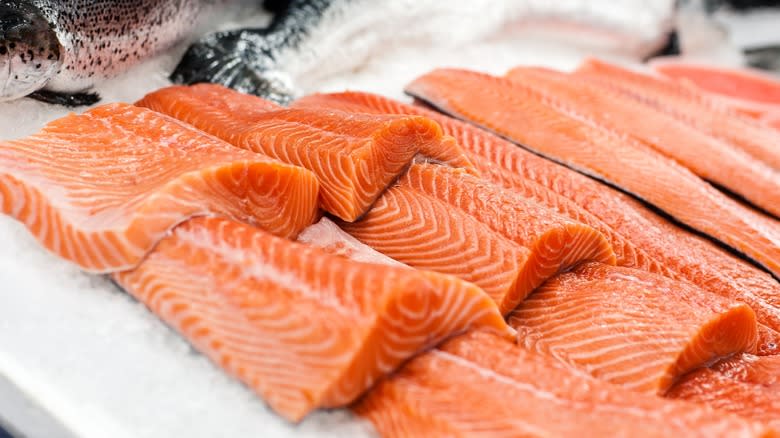
Since a young age, many of us have been taught a very simple rule about the ocean: Big fish eat little fish, and little fish eat tiny fish. But what happens when an even bigger fish comes into play, one that's not even a fish at all? Unlike the lives we live on land, our friends under the sea are dependent upon a balanced and harmonious relationship with what they eat. Only that relationship has been broken down over time, and the solution is entirely out of their control — because it's entirely in ours. We're the even bigger fish, and we're eating everything up. The consequences of that are made no more apparent than in the situation of king (or chinook) salmon, one of the most widely consumed salmon varieties in the U.S.
Considered by many to be the best, Alaskan king salmon is rich, high in fat, and — as the name suggests — big in size. Flavorful and thick, king salmon filets are a prized possession for chefs and home cooks alike. However, this fish is hardly reserved for special occasions. Despite being the most expensive of all the salmon varieties on average, king salmon is also the most widely consumed variety of fresh Pacific salmon.
Today, king salmon has become the rarest species you can buy, and, without any legislative protections, they're only becoming more so, and with far-reaching consequences. It's clear that the future of Alaska's King Salmon is left with one remaining hope — us. As consumers, it's time we think critically about the fish we consume, and that begins with king salmon.
Read more: 15 Different Ways To Cook Fish
The State Of Alaska's Salmon And Orcas
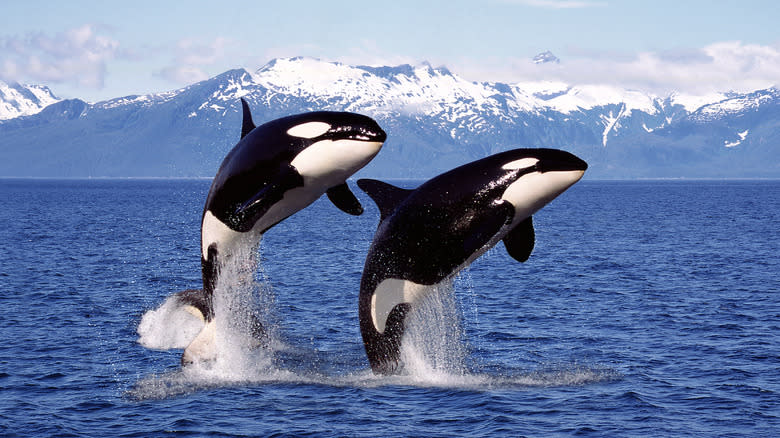
Yes, Seattle is being sued by salmon (and it's not the first time). On May 3rd, 2023, a lawsuit filed in 2020 by the Washington State-based environmental group, The Wild Fish Conservancy, against Alaska's King Salmon fishery was issued its final ruling to halt the overharvesting of chinook salmon. This effort was put forth to save both the state's salmon population, as well as its beloved Southern Resident orcas. With only 75 remaining on the planet, it's no coincidence that the supply of the orca's main food source, king salmon, has also reached historic lows. By the order of a district judge, the fishery was effectively shut down in a measure to sustain both populations. Just a few months later, a last-minute reprieve allowed the troll fishery to re-open again just in time for king salmon fishing season in July.
This is concerning to many because king salmon yield reached a historic low in 2021, falling 80% from 13 million pounds in 1985 to 2.6 million pounds some 40 years later, reports The New York Times. Experts attribute that to a few key environmental factors: habitat loss, agriculture dumping, and fracking pollution. But not only are there fewer King Salmon than ever before — they're much smaller in size. Reports show that less and less King Salmon are reaching full adult age. Couple all that with the fact that they're not only a major food source for orcas, but the entire human population, and it's clear that king salmon are a high commodity with an increasingly scarce supply.
This is having a disastrous impact on the regional killer whale population. Listed as endangered under both the U.S. Endangered Species Act (ESA) and Canada's Species at Risk Act (SARA), the southern resident orcas' decline can almost entirely be attributed to starvation — with two-thirds of all pregnancies failing because of it -- due to lack of chinook salmon, their primary source of food.
Weighing Social, Environmental, And Economic Costs
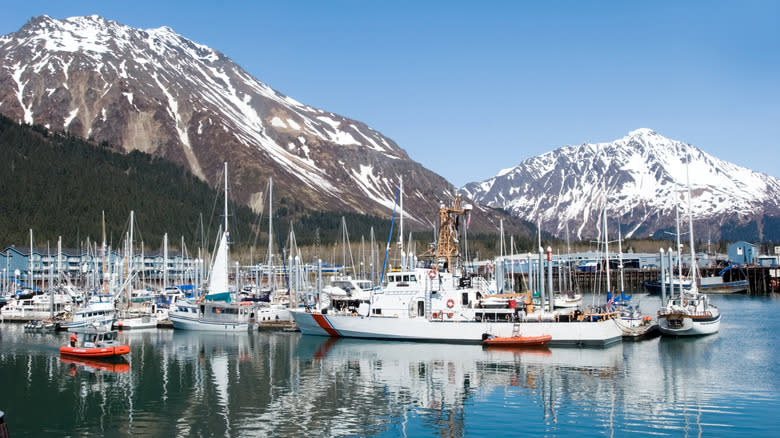
There's no denying how dependent local Alaskan fishermen and businesses are on having access to king salmon. "For many trollers, king salmon accounts for 30-40% of their gross revenue," said Anna and Seth Stewart, owners of Yakobi Fisheries, a fish processing facility in Pelican, Alaska, that has been in the family for generations. Taking king salmon away during the troll season, even temporarily, can be detrimental to the local communities.
Still, a temporary sacrifice might be necessary to preserve a future for King Salmon, and therefore their businesses. The evidence is clear — not only are there fewer king salmon in the ocean, but they're smaller in size. While Alaska's trollers can't be held completely responsible, nor is this simply a fish-management issue, something has to change — if not for the orcas, but also for Alaska's indigenous communities who depend on king salmon for sustenance. Until we as a society can get ahead of climate change and better understand the imbalances occurring in our oceans, we shouldn't consume any more king salmon than we need to, if any at all. What is there should be reserved for the communities and marine mammals who depend on it most.
As Emma Helverson, the director of the nonprofit advocacy group Wild Fish Conservancy, told the Seattle Times, "We acknowledge this economic harm and we're not belittling it. But extinction is what we're trying to prevent here." It's time to stop eating and fishing King Salmon as if it's an unending resource and look to other varieties to ensure a future where they still exist.
Food Businesses Are Taking A Stand For King Salmon
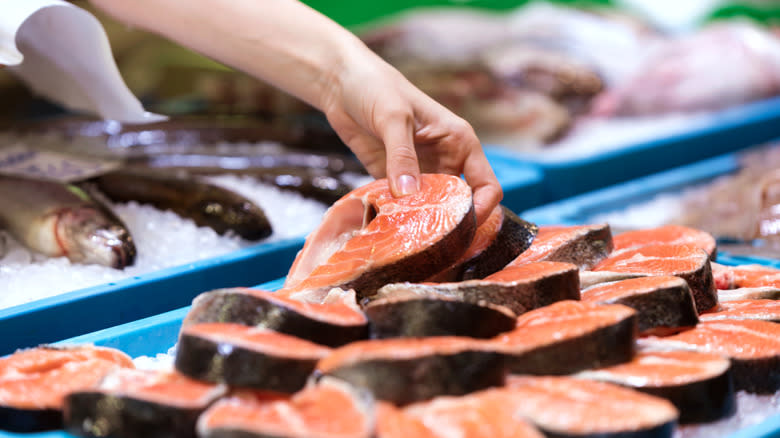
While both Anna and Seth Stewart have recognized a decrease in the size of king salmon over the last 20 years, they aren't particularly concerned about the risk of overfishing them because, as they explain, the state of Alaska does such a good job of tracking what is caught. Some of their clients, on the other hand, don't share the same confidence. New Seasons Market, a grocery chain in Portland, Oregon, and Yakobi's biggest client at one point stopped purchasing King Salmon from them back in 2020 in response to their customers' concern for the Orca population, according to The New York Times — and they weren't the first grocer to do so. Seattle's PCC Markets stopped selling all king salmon and king salmon products harvested from Northwest waters in 2018, and similar trends have been emerged across restaurants in the Pacific Northwest.
And even the Stewarts support reconsidering how often you consume king salmon and divesting into other delicious salmon varieties. "King salmon is delicious and you can't beat it, but it's kinda like chocolate cake — having it every once in a while as a treat is amazing," they tell Tasting Table. But what type of salmon should you have in its place?
A World Of Sustainable King Salmon Alternatives
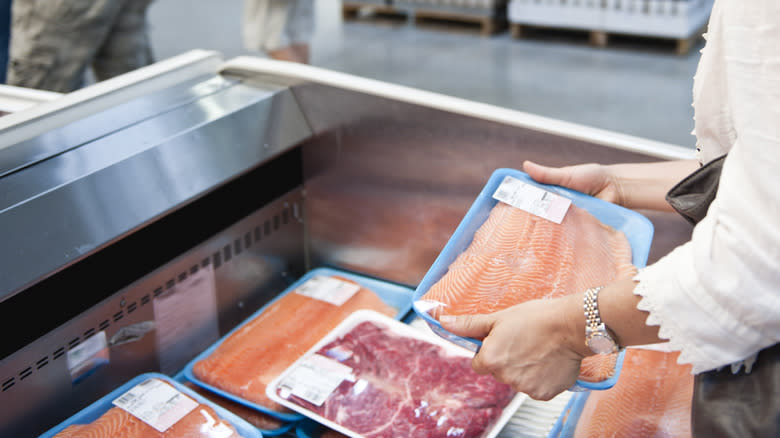
Being a seasonal product, chefs have long sought out alternatives to wild caught king salmon. But knowing the season has only grown shorter and shorter due to the state of Alaska's efforts to help protect the species, the shift has only become more imminent. Now seen as almost a necessity, chefs are beginning to lean even more into other varieties of salmon that were previously pushed into the shadows of the spotlight of chinook. Sockeye, coho, and even chum, for example — all of which were once considered inferior to king salmon — are being given their rightful place on restaurant menus across the country, and for good reason.
For instance, coho, also known as silver salmon, and the Stewarts' personal favorite, is considered a great alternative not only because it's more sustainable than king salmon, but also because it's less oily than with a more subtle and less fishy flavor. Similarly, sockeye, with its bright red color and strong aroma, has now come to be favored by chefs because of its clean, clear salmon flavor. Both alternatives, of course, come with the benefit of having a much friendlier price tag, too. Pink and chum salmon, the varieties that are the most budget-friendly, have always been preferred for use in smoked or canned salmon applications, but are certainly worth expanding in fresh salmon recipes.
When king salmon is taken out of the spotlight, space is then made for other salmon varieties to shine. Without the need for comparison, more sustainable alternatives are being appreciated for their unique qualities. The best part is, by shopping for alternatives sourced from Alaska, you can still continue to financially support Alaskan fishermen while helping pave the way for a long and abundant future for king salmon, too.
Read the original article on Tasting Table.

